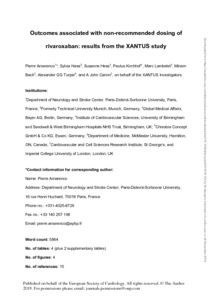Amarenco, P; Haas, S; Hess, S; Kirchhof, P; Lambelet, M; Bach, M; Turpie, AG; Camm, AJ
(2019)
Outcomes associated with non-recommended dosing of rivaroxaban: results from the XANTUS study.
Eur Heart J Cardiovasc Pharmacother, 5 (2).
pp. 70-79.
ISSN 2055-6845
https://doi.org/10.1093/ehjcvp/pvy041
SGUL Authors: Camm, Alan John
![[img]](https://openaccess.sgul.ac.uk/110406/1.hassmallThumbnailVersion/pvy041.pdf)  Preview |
|
PDF
Accepted Version
Available under License ["licenses_description_publisher" not defined].
Download (764kB)
| Preview
|
Abstract
Aims: In Europe, the approved rivaroxaban dose for stroke prevention in patients with atrial fibrillation is 20 mg once daily (od), with 15 mg od recommended in patients with creatinine clearance [CrCl] 15-49 mL/min. Non-recommended doses are prescribed in real-world practice. This analysis of the XANTUS study assessed outcomes associated with non-recommended dosing and patient characteristics that may have impacted dose choice. Methods and results: Baseline characteristics and 1-year outcomes were compared in 4464/6784 patients with known CrCl, receiving recommended or non-recommended rivaroxaban doses; 3608 (80.8%) patients received recommended doses (mean CHADS2 score 1.9) and 856 (19.2%) non-recommended doses (mean CHADS2 score 2.5). Incidence rate (events/100 patient-years) for the composite of treatment-emergent adjudicated major bleeding, stroke/systemic embolism and death was 7.5 (95% confidence interval [CI] 5.7-9.8) and 4.8 (95% CI 4.1-5.7) with non-recommended and recommended doses, respectively (hazard ratio 1.55; 95% CI 1.2-2.1; P = 0.004). Incidence rates for the components of the composite were 3.7 and 2.6, 1.4 and 0.9, and 3.5 and 1.9, respectively. Adjustment for baseline characteristics showed similar rates of the composite outcome (hazard ratio 1.06; 95% CI 0.77-1.45; P = 0.719). Multivariable analysis identified age, anaemia, congestive heart failure, diabetes mellitus, CrCl, lower body weight, atrial fibrillation type, and vascular disease as predictors of non-recommended dosing. Conclusion: Non-recommended rivaroxaban dosing was associated with less favourable outcomes, possibly due to baseline characteristics, in addition to renal function, that may also affect physicians' dosing decisions. Trial registration number: Clinicaltrials.gov: NCT01606995.
| Item Type: |
Article
|
| Additional Information: |
This is a pre-copyedited, author-produced version of an article accepted for publication in European Heart Journal - Cardiovascular Pharmacotherapy following peer review. The version of record Pierre Amarenco, Sylvia Haas, Susanne Hess, Paulus Kirchhof, Marc Lambelet, Miriam Bach, Alexander G G Turpie, A John Camm, Outcomes associated with non-recommended dosing of rivaroxaban: results from the XANTUS study, European Heart Journal - Cardiovascular Pharmacotherapy, Volume 5, Issue 2, April 2019, Pages 70–79 is available online at: https://doi.org/10.1093/ehjcvp/pvy041 |
| SGUL Research Institute / Research Centre: |
Academic Structure > Molecular and Clinical Sciences Research Institute (MCS) |
| Journal or Publication Title: |
Eur Heart J Cardiovasc Pharmacother |
| ISSN: |
2055-6845 |
| Language: |
eng |
| Publisher License: |
Publisher's own licence |
| PubMed ID: |
30423165 |
| Dates: |
| Date |
Event |
| 2019-04 |
Published |
| 2018-11-13 |
Published Online |
| 2018-11-10 |
Accepted |
|
 |
Go to PubMed abstract |
| URI: |
https://openaccess.sgul.ac.uk/id/eprint/110406 |
| Publisher's version: |
https://doi.org/10.1093/ehjcvp/pvy041 |
Statistics
Item downloaded times since 22 Nov 2018.
Actions (login required)
 |
Edit Item |



